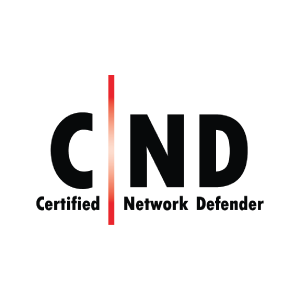
The EC-Council Certified Network Defender (C|ND) certification is aimed at network administrators and IT professionals who are responsible for ensuring the security, resiliency, and integrity of computer networks within an organization.
Duration: 5 Days
$2,295.00
The primary purpose of the C|ND certification is to equip professionals with the knowledge and skills necessary to protect, detect, respond to, and recover from network security threats and attacks.
The C|ND certification covers several key domains related to network defense and security, including:
The C|ND certification emphasizes practical, hands-on skills, including the ability to configure and manage network security controls, analyze network traffic for signs of malicious activity, and respond to security incidents effectively.
Earning the C|ND certification can enhance a professional’s career prospects by demonstrating their expertise in network security and their commitment to staying current with industry best practices. It can also qualify individuals for roles with increased responsibilities and higher salaries within organizations that prioritize cybersecurity.
The EC-Council Certified Network Defender (C|ND) certification is aimed at network administrators and IT professionals who are responsible for ensuring the security, resiliency, and integrity of computer networks within an organization.
The primary purpose of the C|ND certification is to equip professionals with the knowledge and skills necessary to protect, detect, respond to, and recover from network security threats and attacks.
The C|ND certification covers several key domains related to network defense and security, including:
The C|ND certification emphasizes practical, hands-on skills, including the ability to configure and manage network security controls, analyze network traffic for signs of malicious activity, and respond to security incidents effectively.
Earning the C|ND certification can enhance a professional’s career prospects by demonstrating their expertise in network security and their commitment to staying current with industry best practices. It can also qualify individuals for roles with increased responsibilities and higher salaries within organizations that prioritize cybersecurity.
5 days
$2,295.00
In just 7 days, you’ll discover your potential, elevate your confidence, and determine if you’re truly prepared to achieve certification, advancement, and reward—through an engaging self-assessment challenge crafted specifically for ambitious IT professionals.

@ Copyright SteppingStone Solutions, Inc. 2024-2025 All Rights Reserved